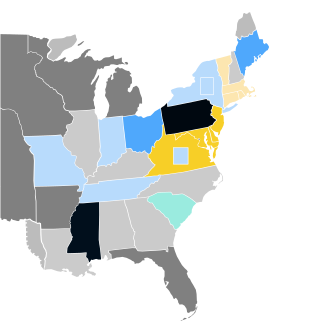
The 1835 United Kingdom general election was called when Parliament was dissolved on 29 December 1834. Polling took place between 6 January and 6 February 1835, and the results saw Robert Peel's Conservatives make large gains from their low of the 1832 election, but the Whigs maintained a large majority.

Nicholas Aylward Vigors was an Irish zoologist and politician. He popularized the classification of birds on the basis of the quinarian system.

The 1834–35 United States House of Representatives elections were held on various dates in various states between July 7, 1834, and November 5, 1835. Each state set its own date for its elections to the House of Representatives before the first session of the 24th United States Congress convened on December 7, 1835. They were held during President Andrew Jackson's second term. Elections were held for 240 seats that represented 24 states, as well as the at-large-district seat for the pending new state of Michigan.

The Repeal Association was an Irish mass membership political movement set up by Daniel O'Connell in 1830 to campaign for a repeal of the Acts of Union of 1800 between Great Britain and Ireland.
The 1835 Democratic National Convention was held from May 20 to May 22, 1835, in Baltimore, Maryland. It was the second presidential nominating convention held in the history of the Democratic Party, following the 1832 Democratic National Convention. The convention nominated incumbent Vice President Martin Van Buren for president and Representative Richard Mentor Johnson of Kentucky for vice president.

The 1834–35 United States Senate elections were held on various dates in various states. As these U.S. Senate elections were prior to the ratification of the Seventeenth Amendment in 1913, senators were chosen by state legislatures. Senators were elected over a wide range of time throughout 1834 and 1835, and a seat may have been filled months late or remained vacant due to legislative deadlock. In these elections, terms were up for the senators in Class 2.

The 1832–33 United States Senate elections were held on various dates in various states. As these U.S. Senate elections were prior to the ratification of the Seventeenth Amendment in 1913, senators were chosen by state legislatures. Senators were elected over a wide range of time throughout 1832 and 1833, and a seat may have been filled months late or remained vacant due to legislative deadlock. In these elections, terms were up for the senators in Class 1.

On October 11, 1836, a special election was held in Pennsylvania's 24th congressional district, to fill a vacancy left by the resignation of John Banks (AM) on April 2. This election was held at the same time as the general elections for the 25th Congress

The 1834 United States Senate special election in Pennsylvania was held on December 6, 1834. Future President of the United States James Buchanan was elected by the Pennsylvania General Assembly to the United States Senate.
Elections to Liverpool Town Council were held on Wednesday 1 November 1840. One third of the council seats were up for election, the term of office of each councillor being three years.

Abercromby ward was an electoral division of Liverpool City Council.
The 1835 Massachusetts gubernatorial election was held on November 9.
The 1834 Maine gubernatorial election took place on September 8, 1834. Incumbent Democratic Governor Robert P. Dunlap defeated Whig candidate Peleg Sprague.
The 1835 Maine gubernatorial election took place on September 14, 1835.

The 1835 Rhode Island gubernatorial election was held on April 15, 1835.

The 1835 New Hampshire gubernatorial election was held on March 10, 1835.

The 1835 Vermont gubernatorial election was held on September 1, 1835.
The Revolution of the Reforms was a military movement in Venezuela between June 7, 1835, and March 1, 1836, against the government of José María Vargas, the conservative Congress, and the influence of José Antonio Páez. It was led by outstanding independence heroes such as Santiago Mariño, Diego Ibarra, Pedro Briceño Méndez, José Laurencio Silva, José María Melo, Blas Bruzual, Luis Perú de Lacroix, Pedro Carujo, José Tadeo Monagas, Renato Beluche, Andrés Level de Goda, and Estanislao Rendon.